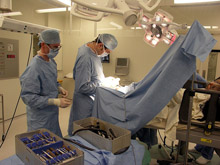The study of health economics (HE) will stimulate anyone who believes that seeking to improve human health is worth using up some of the world’s scarce resources.
Stephen Heasell, Principal Lecturer in Economics, Nottingham Trent University

Image by Badly Drawn Dad
on Flickr
Indeed, many non-health goods (services and products) and activities can be enjoyed and produced more effectively by healthy people than by unhealthy ones. It is little wonder that limitations of current health service access and effectiveness remain controversial. A study of HE, itself no stranger to controversy but established as a sub-discipline of Economics, can help you to explain the controversies or even to resolve them.
You can find graduate jobs and career opportunities in HE around the world, in both private and public sectors. In addition, many more careers in health service organisations and in various companies or government services can be enhanced by the distinctive perspective and ways of resolving policy questions that extended study of HE yields.
HE considers how different ways to decide what to use worldly resources for (that is, their allocation) can have different effects on human health and on goods made available in the name of improving health. These insights are often applied to proposals for changes to established health service systems.
Modules and programmes in HE vary considerably. On many such courses, however, you will be able to study how, in different regions of the world at different times, resources have been allocated to health-related goods. You will also be able to see how limits to resource use in the name of human health can be decided and what the consequences for various interested parties, intended and unintended, could be.
It is likely that you will be able to apply various techniques drawn from introductory market economics (on many courses, mainly microeconomic ones) to the particular case of health-related goods of various types. The effect of risk and information on decision-making about investing for health, by private individuals or organisations and by the state, is also likely to be a prominent feature. Courses vary considerably in their use of quantitative methods and in the extent of their inclusion of alternatives to the perspective on health derived from mainstream economic theory.
The invaluable knowledge, skills and attributes you can acquire by studying HE can also be applied with some adaptation far beyond the health sector. In particular, they can readily be applied to any goods for which gains to consumers and citizens depend crucially on establishing and maintaining a successful relationship of trust between supplier and consumers; education being an example.
Your course in HE might include a detailed investigation of particular types of health service institution or organisation, from an economic perspective. Individual hospitals, pharmaceutical or health insurance companies, regulators appointed by government and professional groups such as clinicians or health service managers could all feature; so could the Economics of professional relationships between them within a particular health service system, such as the National Health Service (NHS) in the UK or Medicare in the USA.
Most importantly of all, perhaps, you can study the relationship between service provider and individual patient from an economic perspective while remaining ever-mindful of human aspirations and vulnerability where the risk to health is concerned.